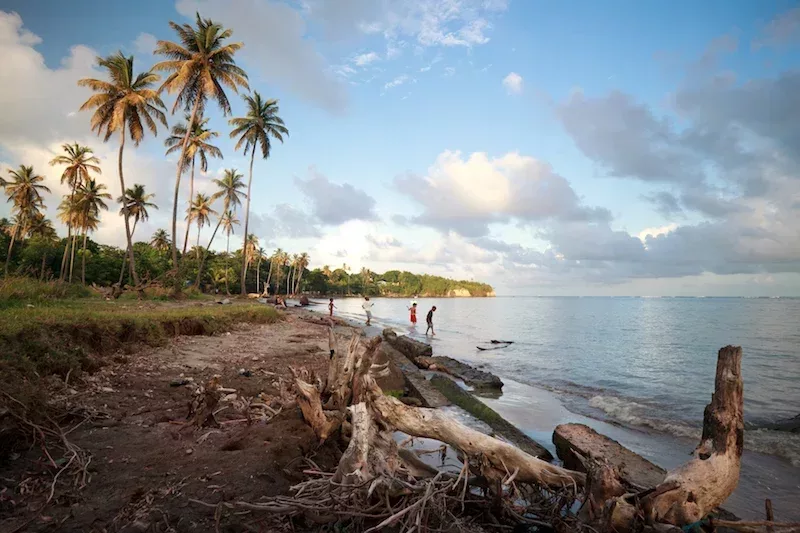A new scientific paper reveals the direct link between healthy coral reefs and shoreline stability, and field-tests an innovative risk reduction solution that combines engineering with reef restoration.
The catastrophic 2017 hurricane season provided ample demonstrations of the increasing vulnerability of Caribbean populations and infrastructure to natural disasters. A new study, published by UC Santa Cruz (UCSC) and The Nature Conservancy, in the Journal of Environmental Management systematically measures the protective role of coral reefs, and field-test a solution that reduces coastal risk by combining innovative engineering with restoration ecology. The study evaluates one of the first uses of reef restoration as natural infrastructure specifically designed to reduce risks to people and property, and reveals that coral degradation is directly linked to the severe erosion which threatens Grenville Bay, Grenada.
The researchers demonstrate a direct link between healthy reefs and shoreline stability in Grenville Bay, Grenada, showing that healthy reefs reduce the wave energy arriving on shore. Grenville’s healthy reefs keep more than half of the Bay’s coastline intact. In contrast, severe reef degradation is linked with chronic coastal erosion in the northern section of the Bay, where the shoreline is disappearing at a rate of nearly two feet every year. In an attempt to adapt, villagers have built makeshift barriers with tires and driftwood to slow the erosion threatening their homes (see image).
“We are able to apply coastal engineering tools and models to support reef science and management. Ours is one of the first studies to directly show, with evidence from the field sites and engineering models, the impacts of reef loss on shorelines.” said Dr. Borja Reguero, from the University of California Santa Cruz and lead author of the study.
Since 2013, the Conservancy has led an ecosystem-based adaptation (EbA) project in Grenada, At the Water’s Edge (AWE), a community-based initiative to increase coastal resilience to climate change. One major component of AWE is innovative coral reef restoration to facilitate the recovery of the coral reef, which will in turn directly reduce coastal erosion and flooding. The study field- tests a reef-based hybrid submerged breakwater structure, which represents one of the few existing examples of reef restoration designed to increase community resilience with the use of nature. With support from The German Federal Foreign Office and in partnership with the Government of Grenada, the Grenville Bay communities, Grenada Fund for Conservation, Grenada Red Cross Society and Underwater Solutions, the pilot reef-based breakwater structure was formally launched in early January 2015.
“Grenada is on the frontlines of addressing the impacts of climate change, not only through its international leadership role in climate adaptation strategies for small island developing states, but also locally, with the implementation of projects which use nature-based solutions to enhance communities’ resilience, and their capacity to adapt to climate change.” said Nealla Frederick, AWE project lead.
The innovative design is constructed from locally sourced inexpensive materials, utilized local community labor, was easy to ensemble on-site, is suitable for high wave energy or hurricane exposure, and is specially designed to encourage habitat restoration and enhancement. Live coral fragments from the existing reef were placed onto the structure to encourage natural reef growth. This approach is designed to be replicated in small island communities, which are often the most susceptible to the impacts of climate change.
A growing body of scientific studies and project-based experiences shows that coastal habitats such as coral reefs, oyster reefs, mangroves, wetlands and dunes can offer cost-effective protection from the increasing impacts of climate change. This study builds on this knowledge, highlighting the potential and importance of prioritizing and investing in coastal habitats as cost-effective natural infrastructure. Island nations can meet their adaptation and hazard mitigation goals by investing in nature-based defenses to significantly increase their coastal resilience and reduce the growing economic and human losses caused by coastal hazards.
“Reef degradation destroys the natural breakwaters for tropical coastlines in the USA and across more than 60 other nations. Our study identifies how severe this problem can be and most importantly we used that information to design an innovative reef restoration solution to help people and nature.” said Dr. Michael Beck, coauthor, lead marine scientist at The Nature Conservancy and Research Professor at UC Santa Cruz.

